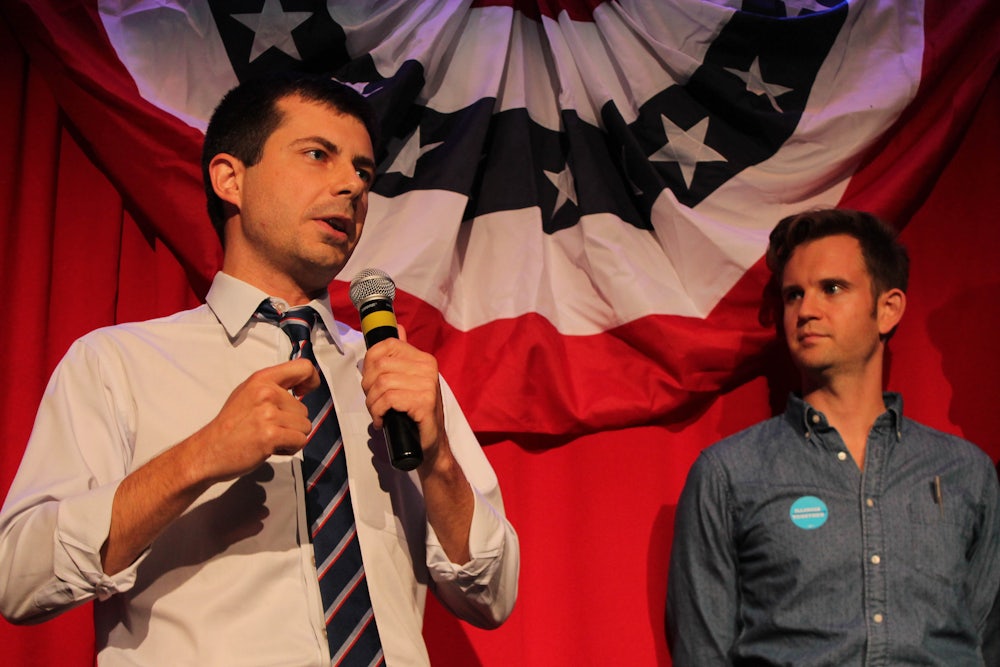With their party now decimated at the national and state level, Democrats cling to one refuge for promoting progressive policies in the Trump era: Cities. They still control two-thirds of America’s biggest ones, and mayors nationwide are vowing to defy the new president’s agenda by shielding undocumented immigrants from deportation, pushing their own efforts to fight climate change, and working to preserve their citizens’ healthcare even as the Affordable Care Act faces repeal. Cities are where Democrats can still prove their muster, lead by example, and offer Americans an alternative vision under Republican rule.
That’s part of the appeal of Pete Buttigieg, the 35-year-old mayor of South Bend, Indiana (pop. 101,000), who was a late entry this month in the campaign to chair the Democratic National Committee. A gay Afghanistan veteran, Harvard graduate, and Rhodes Scholar, he says he’ll turn around his party like he’s turning around his Rust Belt city—promoting progressivism in places where it’s in short supply. Former DNC Chair Howard Dean calls him “the wild card” in this year’s race, and he’s a rising star nationally, promoted by President Barack Obama and hailed by New York Times columnist Frank Bruni as potentially the first gay president.
You could see the appeal Wednesday night, when Buttigieg stood out with poise and presence at a George Washington University debate of the DNC chair candidates sponsored by the Huffington Post.
The forum did nothing to heighten the contrast between the two perceived frontrunners—Minnesota Representative Keith Ellison and Labor Secretary Tom Perez—who refrained from challenging each other and raised few discernible differences between each other. But Buttigieg set himself apart from the other second-tier hopefuls: South Carolina Democratic Party Chairman Jaime Harrison, New Hampshire Democratic Party Chairman Ray Buckley, Idaho Democratic Party Executive Director Sally Boynton Brown, and former Fox News commentator Jehmu Greene.
Buttigieg-mentum? https://t.co/wBP6kyzzQx
— Aaron Blake (@AaronBlake) January 19, 2017
He is not going to win the DNC race, but Buttigieg is really impressive. Going to be interesting to see what's next.
— Clara Jeffery (@ClaraJeffery) January 19, 2017
At DNC forum hosted by huffpost, pretty impressed by Mayor Buttigieg so far.
— Sam Stein (@samsteinhp) January 19, 2017
Buttigieg delivered some good lines, highlighting what he describes as the special accountability of holding local office. “You know, we’re all worried about living in this fact-free world we’re in right now,” the mayor said. “The great thing about the local level is you don’t get to do that. Either the pothole got filled or it didn’t. It’s not like proving I wasn’t born in Kenya.”
He was pithy, too. When candidates were asked for 10 words or fewer to describe why Democrats oppose Trump’s agenda for America, he was closest to actually adhering to the word count. “Freedom. Fairness. Families. Future,” Buttigieg said.
“I got six left?” he joked. “Lives depend on the choices that are made here.”
That was Buttigieg’s key theme of the night. More than any other candidate, he connected the threat of Trump to real consequences for Americans. “This is life-and-death stuff,” he said, “and we’ve got to make sure we’re talking in terms of that, not in terms of the politicians and their antics, as though they were what really mattered.”
At one point, Buttigieg made the point by describing his Thanksgiving Day. “Thanksgiving morning, by the way, I spent in a deer blind with my boyfriend’s father, so how’s that for a 2017 experience?,” he said. “But in the afternoon, we were sitting around the coffee table and his mom showed me this tube of cream, about the size of a tube of toothpaste. Only it’s not skin cream. Well, it is, but it’s topical chemotherapy her life depends on. It costs $2,000 a month. What is she supposed to do if they take away the ACA she used to pay for that?”
“Twenty million is a big number,” the mayor added, referring to the number of Americans insured by the Affordable Care Act, “but it’s just a number until we bring it back to the real lived experience of Americans, and when we do, we’re gonna win.”
